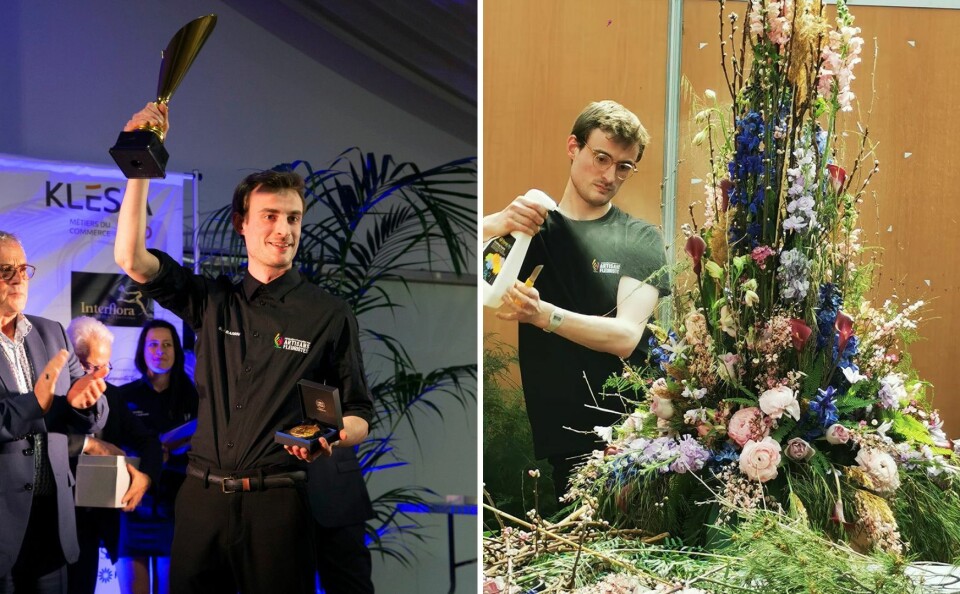-
Ballet lessons bring health benefits to over-55s in France
Online classes with the Silver Swans are transforming lives of older adults
-
Photos: forget Amsterdam - stunning images of France’s tulip fields in bloom
These spots in south-east France are showcasing a rainbow of bright spring flowers
-
Profile: Dorothée - France's beloved TV icon and screen mum
Profile of the singer, actress and TV presenter who captivated millions of schoolchildren
France’s top florist is just 24 but has been learning since age four
After scooping gold in the French Cup, Benoit Barbin intends to continue mastering the art of floristry but has his sights set on the Coupe du Monde des Fleuristes

Benoit Barbin has always associated being a florist with competing.
His gold medal at the Coupe de France des fleuristes, a national floristry competition, in March has helped boost an impressive CV for a 24-year-old.
Contests make you learn fast
Mr Barbin considers the prize to be the “highest national award in the flower industry”, an achievement that ranks alongside his other gold medal at 2018’s Olympiades des métiers and several previous top rankings across similar categories since 2017.
“Contests are a great way to learn a lot of things fast, surpass yourself, and explore other working techniques,” said Mr Barbin.
For the last three years, he has been working at Monsieur le Fleuriste on Avenue Daumesnil in the 12th arrondissement of Paris, honing his craft under mentor Gil Boyard, a highly respected florist and one of three industry figures Mr Barbin said he had always dreamed of working with.
€15,000 spent on his entry
The theme of this year’s national contest was “submerged city”, a nod to the archaeological site of Olbia, located off the coast of Hyères in the Var, south east France, where the contest took place.
Mr Barbin used 120 different varieties of flowers from France, the Netherlands, Italy and even Japan, spending more than €15,000 on his entry.
He actually bought the flowers twice, using the first consignment to practise his arrangement at home a week before the competition started.
“If you want to win, you cannot come on D-Day and expect the composition to be perfect,” he said.
“He was awarded for his regularity and consistency,” said Pierre Marie Julian, owner of Julian Fleuriste in Paris and one of this year’s jury members.
He said Mr Barbin was not the best across all six categories, but was able to successfully minimise points lost.
Learning at his mother’s knee
Mr Barbin’s passion for flowers was nurtured in his family’s garden in Saint-Julien-du-Terroux, in the Mayenne department, where his mother started teaching him floral art as early as four years old.
His interest in the competitive side grew after subscribing to trade publications at the age of eight.
His interest took him to horticultural college in Blois (Loir-et-Cher), 350km away from his parents, after they convinced him to pursue his passion when he was rejected from a science baccalauréat at a school closer to home.
He graduated with a Certificat d’aptitude professionnelle (CAP) in Angers (Maine-et-Loire) a year later, and took an apprenticeship with Mr Boyard.
Tailored bouquets for each client
Mr Boyard’s shop, Monsieur le Fleuriste, specialises in more unusual varieties of flowers, with staff buying them early at the Rungis international market, the largest food and horticultural market in the world, before preparing and arranging them in the shop.
Mr Barbin helps customers make tailored bouquets by mixing different colours and textures according to their taste, something he likens to the rigorous requirements of competing.
He puts every effort into understanding the client’s demands and spends “a lot of time” selecting plants.
Outdated ideas
“I like making bouquets that say something poetic or emotional,” he said, although he is quick to downplay the notion that certain flowers carry specific meanings.
“I think it is outdated,” he said. “Flowers are meant to deliver a thoughtful, personal and greater message than the traditional sense people attach to them.”
He is nevertheless aware that some customers cannot see beyond these predefined meanings, relating the story of a client who asked for chrysanthemums to be removed from her bouquet after finding out they are associated with death and often placed on graves in France.
This was despite calling them “beautiful” on first glance.
“If they are beautiful, why not add them in a bouquet?” he said.
Taking a break from competing
Since his Coupe de France victory, Mr Barbin has put his experience and knowledge towards helping up and coming florists, and recently flew to Krakow in Poland to teach.
He is adamant competitions will go on the back-burner for a while, with his victory signifying the end of “a time-consuming cycle of five years of non-stop contests” in which he sacrificed friends and money.
A future world champion
On the horizon, however, remains the Coupe du Monde des Fleuristes Interflora, an international floristry competition which takes place every five years.
He said participation requires a good knowledge of all aspects of the flower industry, including marketing – something he has little interest or experience in at the moment.
“I need to be more mature and established in my art. It is unrealistic to compete before turning 30,” he said.
Related articles
Green city Poitiers says ‘non’ to French Ville Fleurie competition
French lavender overproduction puts iconic crop in danger
Full-time art of running a thriving florist’s shop
























